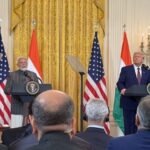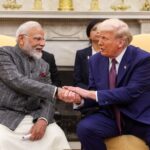With the festive season about to begin, the Trump administration’s abrupt tariff overhaul has left the Indian diaspora in the United States bracing for a hollow celebration. India Post has announced it will suspend nearly all parcel shipments to the U.S. from Aug. 25, a move that severs one of the most relied-upon cultural connections between Indian families and their relatives abroad.
For decades, parcels filled with sweets, clothes, and puja items have been dispatched across oceans in the weeks leading up to Ganesh Chaturthi, Navratri and Diwali. This year, those packages are unlikely to reach their destination. “It’s not just goods. It’s blessings, emotions, and tradition that are being blocked,” said a social media post.
The disruption follows Executive Order 14324, signed by President Donald Trump on July 30, which scraps America’s $800 de minimis duty-free allowance. Starting Aug. 29, every shipment will attract tariffs — either calculated at ad valorem rates or slapped with flat fees of $80, $160 or $200, depending on the exporting country’s tariff bracket.
The rules were billed as a crackdown on undervaluation and cheap imports. But U.S. Customs and Border Protection has yet to operationalize the systems required to process duties on such shipments, creating regulatory chaos.
“As U.S. systems to implement these changes are not yet fully in place, there is uncertainty over how much duty will be charged on shipments arriving after August 29,” said Ajay Srivastava of the Global Trade Research Initiative (GTRI). “As a precaution, India Post has announced it will halt most mail to the U.S. starting August 25, citing carriers’ inability to process parcels under the new rules. The suspension underscores the immediate fallout of Washington’s new trade measures, which are expected to disrupt global e-commerce and hit exporters in India and other countries that depended on small-value, duty-free shipping.”
For Indian exporters, particularly micro and small firms selling handicrafts, textiles, and jewelry online, the suspension is devastating. The duty-free exemption gave them a rare competitive edge in the U.S. market. With that gone, margins will be squeezed, and their diaspora customer base may vanish.
For families, the impact is emotional and immediate. Across U.S. cities, Indian-American households are recalibrating festival plans, knowing that the packages they count on may not arrive. “Our children grew up waiting for those Diwali parcels — the smell of sweets, the touch of clothes stitched in India. What do we tell them now?” asked a Delhi-based parent.
Critics say the Trump administration has chosen political theatre over cultural sensitivity, punishing communities far removed from its trade dispute with China. “If the idea was to protect American manufacturers, the timing shows an indifference to the sentiments of immigrant families,” said a Delhi-based policy analyst.
The episode threatens to strain ties with one of the US’s most affluent and politically influential immigrant groups. With elections looming, the message to the diaspora is hard to miss: festival joy has become collateral damage in a tariff war.
Unless clarity emerges quickly from Washington, the Indian-American community faces a muted season of celebration — with the Trump administration cast as the unexpected Grinch in the year’s most festive months






